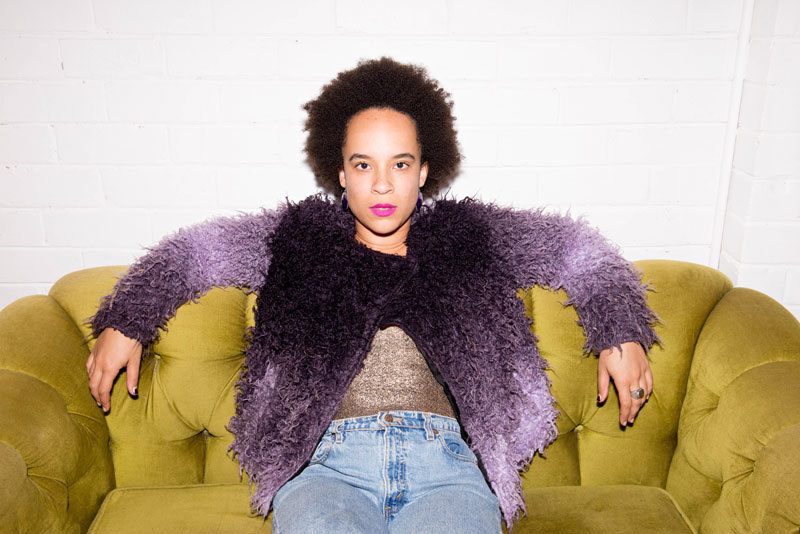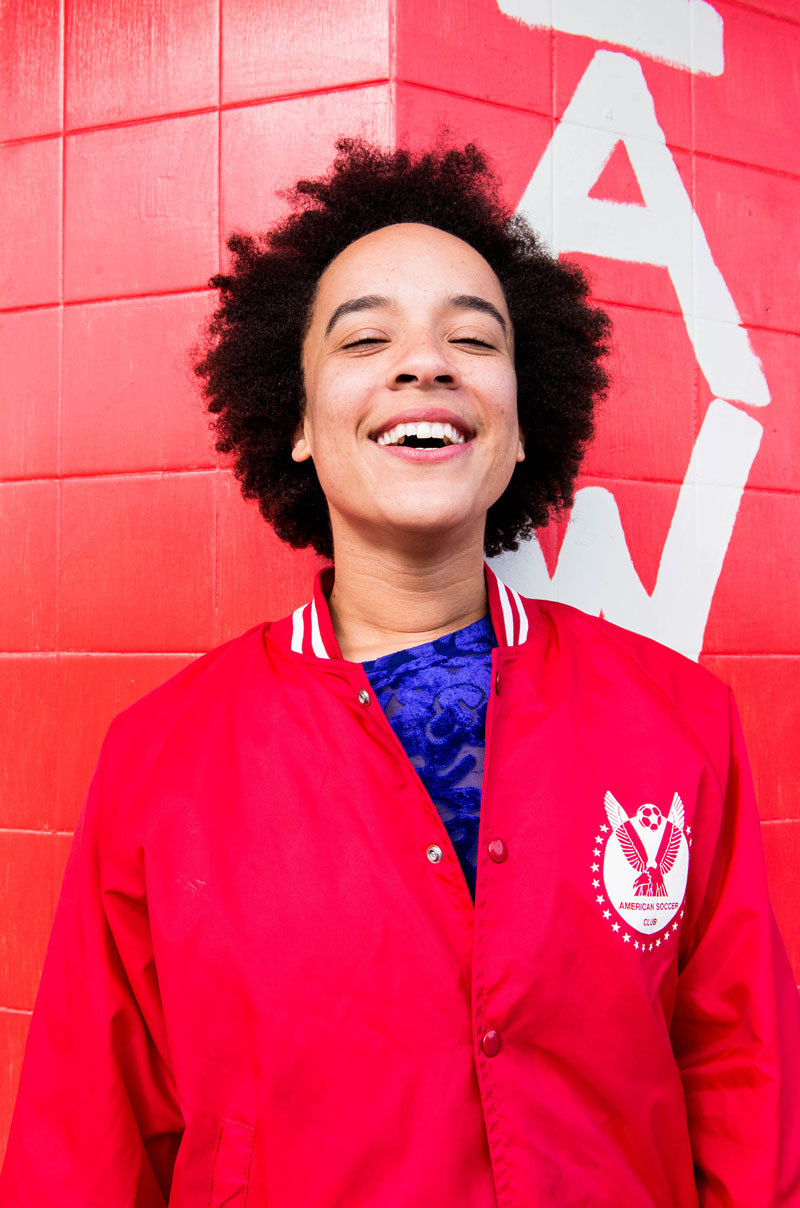Nkechi Anele’s assertive tone oscillates between strong and serene when she speaks. The confident flair in her voice could easily be attributed to her role as the lead singer in popular funk band Saskwatch, but in reality it has more to do with coming to understand herself as a biracial woman and artist. Since co-founding The Pin a year ago — a website dedicated to essays and interviews exploring race, identity and culture — Nkechi has spent the past 12 months learning from other mixed-raced creatives about the importance of being proud of your multicultural heritage in a modern Australian context. In a short period of time she has evolved from talented singer to confident artist, with a political drive and a strong desire to diversify the music industry.
Whether she’s organising sold out conferences on music and identity politics, using her position as the new host of Triple J’s Roots n’ All to bring cultural diversity to the station or asserting more agency on the band’s new album, Nkechi is pushing to bring a much needed sense of pride and visibility to a broader range of voices in creative industries. We caught up with her to talk about selfhood, her journey as an artist and how important it is to understand that a mixed-raced upbringing is a creative asset.
Last time you spoke to i-D your site The Pin had just launched. How have things evolved for the project since then?
It’s been interesting and surprisingly good. I remember a year ago when we started we were sending out emails saying to people ‘hey, we have this idea’ but we had absolutely nothing to back it up and we were not even writers. Sometimes we would even use me being from Saskwatch as leverage, to let people know we weren’t trolls. Now it’s just amazing to see that we’ve had a really good response and we’ve grown a solid following and community. We’ve heard in passing people refer to our articles many times and our first conference earlier this year sold out. In general, I see more people actually having these conversations on race and identity. It’s great.
A lot of multicultural people, including myself, find The Pin really important in understanding our complex identities. Do you feel like it has also changed the way you understand yourself?
Absolutely. I’ve become much more okay with who I am. I think there was a lot of denial in me before. For a long time I fought against feeling African by having a lot of anglo-friends. I thought that if I hung out with them and acted like them maybe I would fit in and look like everyone else. It took me a while to realise how much I needed to hear people with my same experience share their stories and so this project was a great way to make friends with a much more diverse group of people, a community that actually understood me.

I guess it takes time to figure out that certain things that make you feel othered are actually what often make you unique, like a multicultural upbringing.
People say that the things you hate about yourself when you are a kid are what will make you stronger when you are older. I’ve had so many moments when it’s clicked that those things that I used to be so ashamed of are actually my assets.
On a music industry level it feels like there are more conversations around race and culture happening in the media, particularly because over the past years we’ve had artists like Tkay Maidza, Remi, Ngaiire, Sampa and A.B Original fully take off. How has their visibility been important for you as a musician?
Seeing amazing artists like Ngaiire, Sampa, Remi and Briggs own their identities makes me feel better as a person as well as a musician. I have talked to Remi, Sampa and Ngaiire through The Pin and one of the things we have talked about was the moment where we saw someone that looked like us doing something we thought was out of our reach. I feel as though now, these artists are doing that for other Australians and new artists that we’ll see in the future will sight these guys as the people that made them realise that they could be successful musicians and not be pigeonholed into genres of music that people think they should play based on their looks.
That’s such an important narrative to break in the music industry. Which makes me wonder, since you started working as the host of Triple J’s radio show Roots n’ All, how have you used this large platform?
As a part of public broadcasting service I am meant to be completely unbiased in what I say. In saying that, probably because I am a person of colour, I feel like I aim to play a lot more diverse music than someone who wasn’t. I feel like I want the show to feel much more applicable to people who look like me and listen to Triple J. The biggest challenge for me is that I want to do it properly, without taking the piss out of other people’s cultures or saying things like ‘oh wow, here’s some world music’. I hate the term “world music” it gives me the shits.
It sounds like over the past year you’ve discovered the strength of your own voice. Has this empowerment made you bolder when addressing audiences?
Totally. I used to hate talking between songs but now I feel more confident when it comes to talking to large groups of people. Last year, I was lucky enough to be a guest of Uncle Jack Charles when he was doing his talk series. We spoke about The Pin being created out if the question ‘where are you from?’ and I said in front of a large audience; “sometimes I just want to say ‘I came out of my mum’s vagina, where are you from?'” I couldn’t believe it. My mom was part of the audience and was looking at me in the eyes and everything. I was shocked with myself when I said it but at the same I think people needed hear that and wake up a little.
Credits
Text Triana Hernandez
Photography Giulia McGauran
